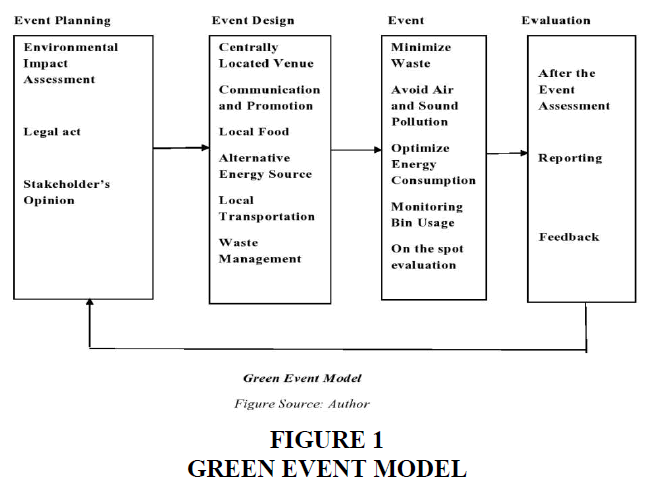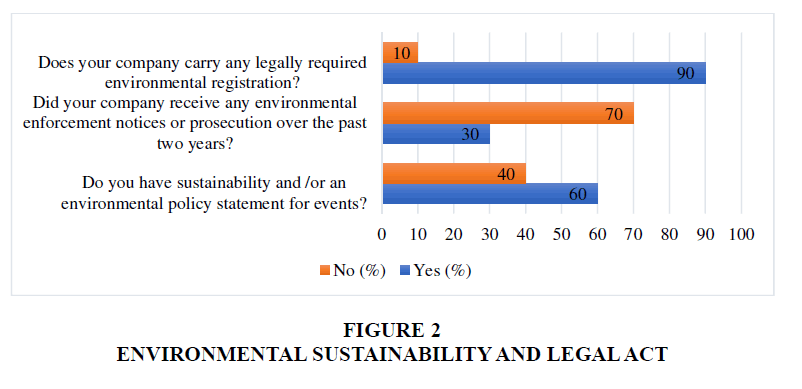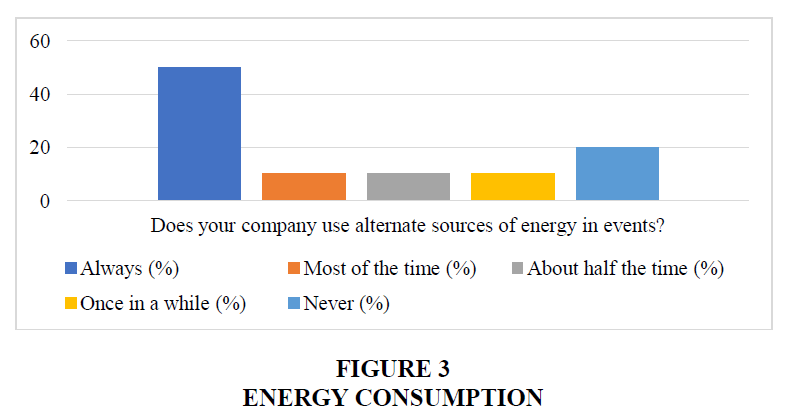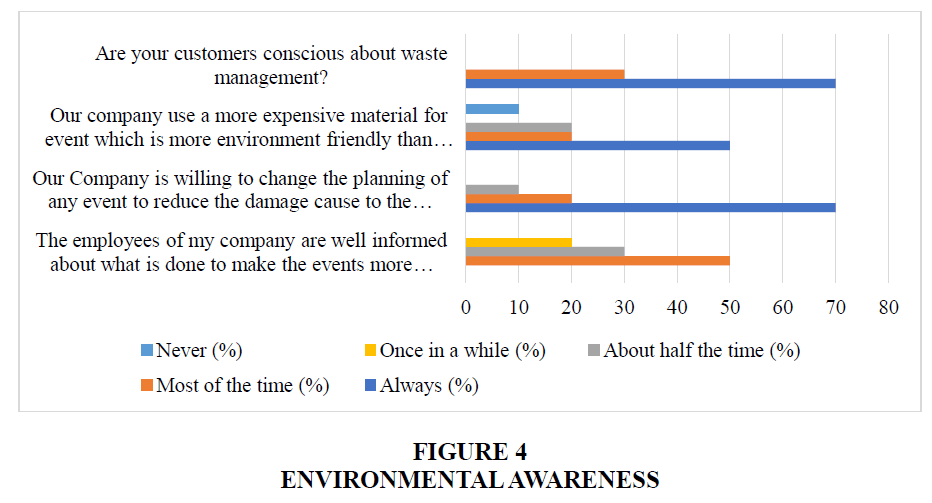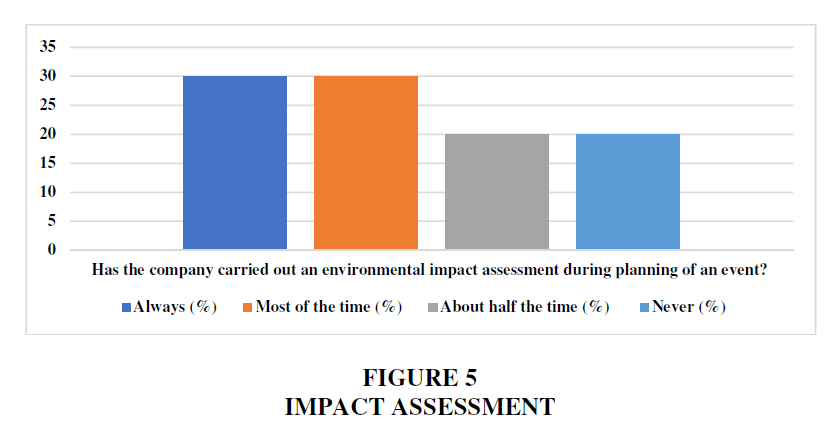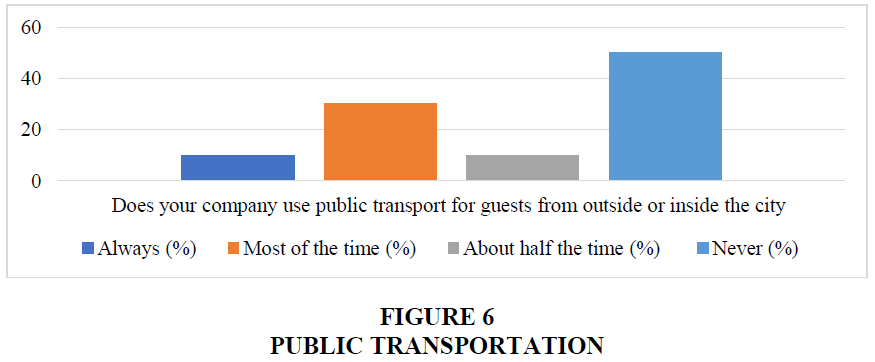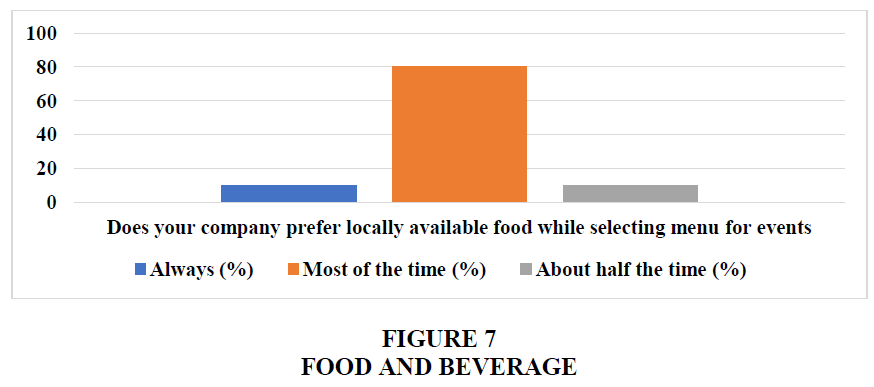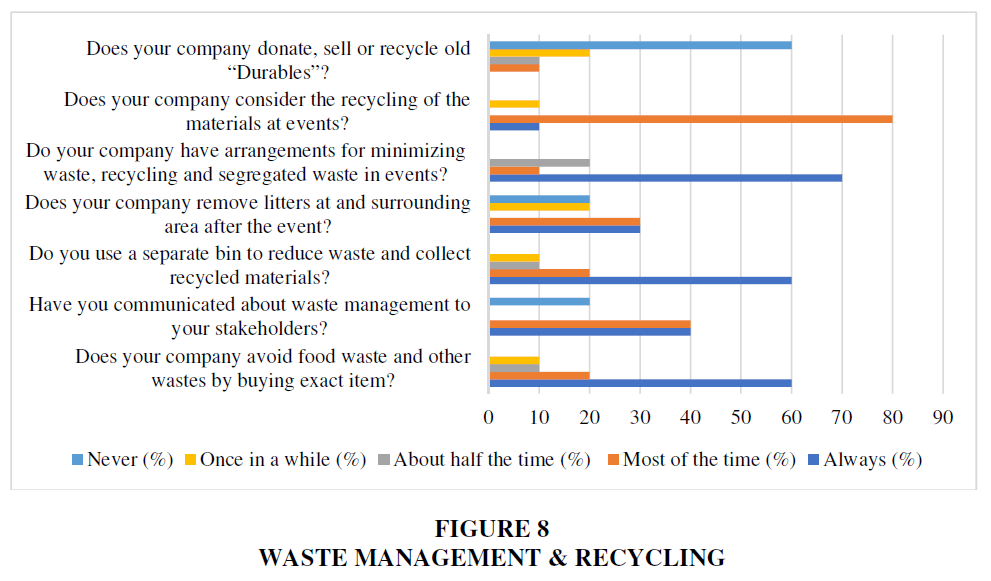Research Article: 2020 Vol: 19 Issue: 4
Perception of Event Management Company towards Green Event: Evidence from Bangladesh
Sharmin Sultana, Daffodil International University
Mahbub Parvez, Daffodil International University
Rehnuma Sultana Khan, Southern University Bangladesh
Mehedi Shahnewaz Jalil, Radio Bangladesh
Abstract
Event Management becomes well recognized ideas in recent days. The development of event management companies relieves people from the hassle to look after an event and allow enjoying. People prefer to give the responsibility of managing any event to an event management company. There are multi types of events like educational, cultural, social, etc. and these events cause multiple negative impacts on the environment like energy losses, pollution, and congestion. Green event concepts can reduce these negative impacts on the environment and enhance sustainability in nature as well as tourism. The objectives of the study are to identify the characteristics of green events, to illustrate some ideas to organize green events and to examine the opinion of event management companies to recognize the prospects of green events. Qualitative in nature, this study is based on some secondary sources of data from websites and research papers. A closed ended questionnaire is designed to collect data from a few selective event management companies. The convenience sampling method is used to collect data from 10 major event management companies in Dhaka and Chittagong. The findings of the study are to inform, stimulate the event management companies about green events and their perception about implementing green event trends in different events. Then, it concluded, with proposed recommendations to ensure environmental sustainability in Bangladesh.
Keywords
Green Event, Sustainability, Event Management, Perception, Bangladesh.
Introduction
An event comprises many unique attributes. It can be categorized as giving “once in a lifetime” experiences for the participants; it is generally expensive to stage; it usually takes place over a short time span; it requires long and careful planning; it carries a high level of risk, including financial risk and safety risk; and it involves many stakeholders, including the event management team (van Der Wagen & White, 2004).Over time, the event industry has played a key role in human society and has long existed as part of the tourism and hospitality industry (Shone & Parry 2004).
Event management firms can be classified into four broad categories (Event Management, 2007) Leisure events e.g. leisure sport, music, recreation; Cultural events e.g. ceremonial, religious, art, heritage, and folklore; Personal events e.g. weddings, birthdays, anniversaries; Organizational events e.g. commercial, political, charitable, sales, product launch, exposition.
The term “green event” is quite a new word in the event industry for sustainable development and integrates with broader components of social, cultural, economic and environmental roles, combined with the reduced energy consumption, reuse sources and recycled materials (Getz, 2009). Green means reduce, reuse and recycling. Green event means organizing, managing and concluding an event in an environment friendly way. Energy saving, waste management and recycling are the key concepts of green events. An event consists of waste management, power, water, print and promotion, accommodation, transportation, food, drink, entertainment etc.
Thousands of events take place every year in Bangladesh. In 2020, around 50 exhibitions and fairs are being held; 42 conferences are going to be held. (Source: 10times.com). In Bangladesh, people celebrate multi-types of events whole year such as bishwa ijtema, chobimela, boshonto utshob, international mother language day, birthday of the father of the nation, holi, lalon festival, independence day, honey collecting, boisabi, Bengali new year, Buddha Purnima, Nazrul Jayanti, Rabindra Jayanti, Ramadan, mango festival, Eid-ul-fitr, rath jatra, day of mourning, Eid-ul-adha, janmasti, durga puja, lalon festival, national revolution day, maha raas leela, Dhaka festivals, Eid-Milad-un-nabi, martyrs intellectual’s day, victory day. (Source: Lonely planet) So, these variety of events are organized by the event management companies in big cities like Dhaka and Chittagong. An event management company creates an entrepreneurial figure, job opportunities for many people and contributes to the economy. Events have negative impacts on the environment too such as sound pollution, air pollution, and food wastage, waste of energy, non-disposable waste, legal act, safety, risk and regulations. These impacts can be reduced by implementing “Green event” concept in the country and ensures sustainability in future.
Literature Review
Event
The term event is used for describing different activities such as art, sports, tourism and social activities, which can be organized by giant organizers professionally and formally (Beyer, 2006). It is a gathering or meeting of a target group at a specific time and room, where a message is communicated (Martins, 2006)
Civic events, conventions, expositions, fairs and festivals, hallmark events, hospitality, incentive travel, meetings and conferences, retail events, reunions, social life-cycle events, sport events, and tourism are the examples of subfields of events (Goldblatt, 2005). Events can be categorized by their sector or size, for instance, the conferences, meeting and exhibition, entertainment and arts, sports events and so forth (Getz, 2008). Increases in leisure time and discretionary spending have proliferated the public events, celebrations and entertainment. Events are emerging worldwide and have economic and socio-cultural impacts on the destination and host society.
An event is always composed of many different but interrelated functions, and this industry is closely linked to the human race, including social and cultural values, the sense of belonging and identity (Janiskee, 2006). Events not only bring people together but also can provide significant economic benefits. (Kose et al., 2011)
“An event can be defined as a ‘live’ themed activity in order to achieve marketing objectives”. It is evident that hosting an event will create many positive impacts, such as civic pride, community development, increased employment opportunities, additional trade and business development, raising awareness and negative influences to human being, such as resident exodus, increased risk of security issues, traffic congestion, waste and pollution, disruption of lifestyle and so forth. (Lesjø, 2000)
Event Management Companies
“It is important to make sure that guests of the event are remembering, and even talking about, the event days and weeks after it is over” (Now, 2013). “Event management is a glamorous and exciting profession requires a lot of hard work and dynamism.” Event management is a science as well as culture and social life (Ghunkikar, 2008).
Event management is a process of organizing a professional and focused event, visualizing concepts, planning, budgeting, organizing and executing events (Islam, 2016). Ahmed (2019) discovered that the world of event planning has started to grow, evolve and change hugely over the years all over the world especially after 2000. Event Management companies accumulate services from vendors and present it to clients.
In Bangladesh, three industry gurus namely Mr. Tahsin Saeed, Executive Director, Asiatic Exp.; Doza Alan, CEO, Skytracker Ltd.; and Jamal Uddin Ahmed (Manager, Event and Activation, Akij Foods and Beverage, Ex Manager of Spotlight) are the pioneers of event management companies in Bangladesh. (Ahmed, 2019)
Green Event
Sustainable development represents the development that not only meets the needs of the current generation, but also satisfies the future generations (Jenkins, 2010).
A number of studies have emphasized how event organizers should do in the practical operation procedures to achieve green event (Merrilees & Marles, 2011). Therefore, greening events not just incorporate environmental responsibility, but also social, cultural and economic concern (Laing & Frost, 2010). Thus, green event should provide every aspect of the event, from the event venue, modes of transportation, to the supply of materials and resources, provision of catering and so forth (Sander & Rudancic-Lugaric, 2010), and meanwhile, greening event needs a change in every individual’s attitude and behaviour (Beyer, 2006).
Many other events, such as 2008 Beijing Olympic Games (Ernst et al., 2007), Byron Bay International East Coast Blues and Roots Festival in North East New South Wales in Australia (Merrilees & Marles, 2011) being conscious of the urgent environmental pollution issues, already positioned themselves as eco-friendly and green event, and adopted some green strategies to make the events greener (Martins, 2006).
Laing & Frost (2010) examined the importance of engaging a range of key stakeholders, greening their operations and the challenges involved in green event themes.
Zamzuri et al. (2016) analyzed that, the role of venue providers in providing green facilities is seen as one of the factors that strengthen the motivation of event organizers such as green purchasing activities, waste management, energy efficiency, water consumption, sustainable performance, air quality control, safety and health, corporate social responsibility, information technology used and sustainable orientation.
Chen & Mo (2014) claimed that the needs for prestige, entertainment and relaxation are among the most important motives which trigger the need to attend green events. The evidence is consistent with Mohammad and Som’s research results that people travel with specific motives to fulfil prestige attain entertainment and feel relaxed (2010).
Wang (2017) discovered that, the theory of Planned Behavior is utilized to analyze the significance of every individual’s environmentally friendly behaviour in the green events process.
Objectives of the Study
The objectives of the study are to identify the characteristics of green events, to illustrate some ideas to organize green events and to examine the opinion of event management companies to recognize the prospects of green events.
Research Methodology
Qualitative in nature, some secondary sources are used. And a closed ended questionnaire is designed to collect data from selective event management companies in Dhaka and Chittagong. The convenience sampling method is used to collect data from 10 major event management companies in Dhaka and Chittagong.
Limitations of the Study
The paper has some limitations as it is based on qualitative methods and a small number of samples is collected from only Dhaka and Chittagong for the research. Further quantitative studies are suggested with a good number of samples including customers.
Discussion
The 10 popular event management companies are interviewed to make them understand about this new concept and find out the acceptability to implement the concept among them. The selected 10 event management companies are described below:
Swift Solution
They have a main office at Banani and two more offices at Mirpur and Chittagong. They arranged events like Radisson family day, picnic of Four Points Hotel, social awareness raising events. They got a certificate of appreciation from Four Points by Sheraton.
BD Event Management and Wedding Planners
The location is Mohammadpur, Dhaka. They arrange Engagement, Turmeric Ceremony, Wedding Planning & Birthday Party planning, Photography & Cinematography, Baby Shower, Anniversary, Event Management & Employees meeting, Event Set Design & Stall Design since 2007.
Creative Wedding Planner and Event Management Company
Their office is at Mohakhali DOHS and another office in Australia to build global relationships. Their focus on mainly wedding planning, corporate events and catering services.
Ananta Events
It’s location is green road, Dhaka. They are a professional event management agency based in Dhaka, Bangladesh and offer corporate events, trade events, marketing events, conferences, exhibitions, consumer shows, product launch. Their customers are Jamuna electronics and automobile, BM energy BD limited, BAT, SEFAR, Romania etc.
Blues Communications Limited
Formed with a combination of experienced and young resources, Blues Communications started established in 2012. Blues rides the wave of globalization by taking part in International Musical Conventions and hosting shows abroad.
Events Aid Bangladesh
They started in 2012 at Khilgaon, Dhaka. Events Aid Bangladesh is a primer event management firm with interests in Event Planning, Product Launches, Corporate and private Functions, Experiential Marketing, School, College & Universities Picnic, Corporate Picnic, Corporate AGM, Road Show, Wedding, Interior, Catering.
Eskay Eventz
Eskay eventz is situated in Basundhara R/A, Dhaka. They arrange many big events like wedding, birthday parties of celebrities, grand party for different companies etc.
P2P Communications and Eventz
P2P started its journey in 2015 at Mehedibag, Chittagong. It is the fastest growing and experienced Advertisement Agency, Brand Activation & Event Management enterprise in Bangladesh. Their clients are PHP, Chattogram city corporations, Syngenta, Pacific jeans, Radisson Blu, S Alam group, Well group, Ispahani, A K Khan, Finlay etc.
Six Events
Six events are a prominent event management company in Chittagong since 2013. They arrange event planning, product launches, corporate functions, conferences, marketing and private function. Their valuable clients are Radisson Blu, Rotary district, REHAB, WASA, Sanmar, Chittagong Boat Club, Pran, Square, Robi, ACI, CMP etc.
Chittagong Events
Chittagong events are the oldest, popular and renowned event management company in Chittagong and founded in 2006. Previously, they used to offer only catering services which are known by Shahab Uddin decorators.
Green Event Model
In this model (Figure 1), three stages are assumed of a green event. First one is event planning. In this stage, the event organizer focuses on the assessment strategy that means, in which way an event can be considered as green or environmentally sustainable. Some legal acts should be implemented such as food and alcohol acts, pollution acts etc. Second one is, how the event will be designed, such as selecting a nearer venue, public transportation, communicate electronically, energy and waste management system. Third one is, during the event, which means observing every issue on the spot by team members. Last stage is Evaluation, after finishing the event, there must be some evaluation criteria, assess, report and provide feedback.
Description of the Survey Questionnaire Variables
From the event management company’s responses some key variables are identified. These variables are environmental sustainability, legal act, environmental awareness, impact assessment, waste management, energy consumption, food and beverage, public transportation (Figures 2-8).
Recommendations
1. Budget: “Green concept” may cost much for event planners and stakeholders.
2. Communication and promotion: Registering participants electronically.
3. Exhibit, Display and Logistics Using recycled biodegradable materials.
4. Event constructions and Decorations: Request re-usable decorations.
5. Transportation: A web platform for participants to organize car sharing and taxis.
6. Accommodation: Select hotels within walking distance and use public transport.
7. Food and Beverage: Confirmed number of event participants to reduce food wastage.
8. Water: Using single flush or reduced flush toilets. Using sensor activated taps.
9. Recycle: Recycle mixed paper, glass, cardboard, pen, printer cartridges and nametags.
10. Venue: Choosing a venue accessible via public transport.
11. Energy: Produce electricity using water, wind, solar or biomass.
12. Waste: Waste Separation should be done by providing a separate bin with signage.
13. Green office: Using energy saving technology at the office.
14. Green awareness: Draw up an environmental statement and post it on your website.
Findings
Among the analysis, it is shown that, waste management & recycling, environmental awareness and food & beverage carry higher percentage. That means the event management companies are already aware of these variables and some are already implemented and some are aware of to implement in future. It is also shown that, legal act and public transportation- these two variables got the lowest attention among the event management companies. That means, companies are not aware or practice this system currently. From the analysis, it is proved that there is high possibility to develop, implement and practice green event or sustainability practice profusely from the perspective of event management companies. Now, it’s time to engage, influence and motivate the stakeholders to plan green event for the sustainability of the environment, society and future.
Conclusion
Green event is not new concept in western world. Green event can reduce the consumption of energy, water, food; re-use and recycle event materials; ensure proper waste disposal system. While planning any green event visitors should be made aware of the measures taken through public communications. And, after finishing the event, they should be encouraged to give feedback regarding event sustainability for future events. It’s high time to implement this concept in Bangladesh too to preserve the environment and ensure sustainability to achieve sustainable goals.
References
- Ahmed, S. (2019). Competitive structure and growth potential of event management service industry in Bangladesh: An empirical study. Unpublished doctoral dissertation, University of Dhaka.
- Beyer, S. (2006). The Green Olympic Movement: Beijing 2008. Chinese Journal of International Law, 5(2), 423-440.
- Chen, Y.F., & Mo, H.E. (2014). A survey of push and pull motivations of green event tourists. International Journal of Information and Education Technology, 4(3), 260.
- Ernst, M., Sperlich, A., Zheng, X., Gan, Y., Hu, J., Zhao, X., Wang, J., & Jekel, M. (2007). An integrated wastewater treatment and reuse concept for the Olympic Park 2008, Beijing. Desalination, 202(1-3), 293-301.
- Getz, D. (2008). Event tourism: Definition, evolution, and research. Tourism Management, 29(3), 403-428.
- Getz, D. (2009). Policy for sustainable and responsible festivals and events: Institutionalization of a new paradigm. Journal of Policy Research in Tourism, Leisure and Events, 1(1), 61-78.
- Ghunkikar, M.A. (2008). A project report on event management.
- Goldblatt, J. (2005). Special events: Leadership for a new world. Hoboken, New Jersey John Wiley & Sons.
- Islam, T. (2016). Performance of event management operation of ingenious group.
- Janiskee, R.L. (2006). Event management & event tourism. Annals of Tourism Research, 33, 872-873.
- Jenkins, C.L. (2010). Tourism development and the environment: Beyond sustainability?. Journal of Policy Research in Tourism, Leisure and Events, 2 (2), 195-196.
- Kose, H., Argan, M.T., & Argan, M. (2011). Special event management and event marketing: A case study of TKBL all star 2011 in Turkey. Journal of Management and Marketing Research, 8, 1.
- Laing, J., & Frost, W. (2010). How green was my festival: Exploring challenges and opportunities associated with staging green events. International Journal of Hospitality Management, 29(2), 261-267.
- Lesjø, J.H. (2000). Lillehammer 1994: Planning, figurations and the green' winter games. International Review for the Sociology of Sport, 35(3), 282-293.
- Martins, C. (2006). Why green events matter. Conference & Exhibition Fact Finder.
- Merrilees, B., & Marles, K. (2011). Green business events: profiling through a case study. Event management, 15(4), 361-372.
- Now, R. (2013). Liverpool & Sefton chambers of commerce. Retrieved July 2017, from https://www.liverpoolchamber.org.uk/article.aspx/show/2321
- Sander, I., & Rudancic-Lugaric, A. (2010). Green strategy of business tourism. In Faculty of Tourism and Hospitality Management in Opatija. Biennial International Congress. Tourism & Hospitality Industry. University of Rijeka, Faculty of Tourism & Hospitality Management.
- Shone, A., & Parry, B. (2004). Successful event management: a practical handbook. Cengage Learning EMEA.
- Van Der Wagen, L., & White, L. (2004). Event management for tourism, cultural, business and sporting events. Frenchs Forest.
- Wang, J. (2017). Perceptions of individual behavior in green event-From the theory of planned behavior perspective. American Journal of Industrial and Business Management, 7(8), 973-988.
- Zamzuri, N. H., Awang, K. W., Aziz, Y. A., & Samdin, Z. (2016), Modelling sustainable business event: Extension of drivers and barriers model. The Social Sciences, 11(18), 4368-4371.
